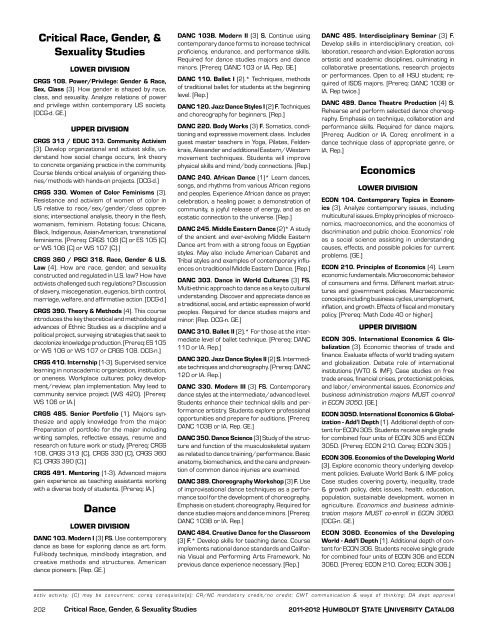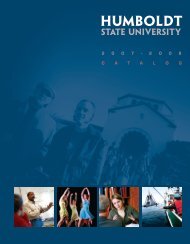2011-12 Academic Year - Bad Request - Humboldt State University
2011-12 Academic Year - Bad Request - Humboldt State University
2011-12 Academic Year - Bad Request - Humboldt State University
You also want an ePaper? Increase the reach of your titles
YUMPU automatically turns print PDFs into web optimized ePapers that Google loves.
Critical Race, Gender, &<br />
Sexuality Studies<br />
LOWER DIVISION<br />
CRGS 108. Power/Privilege: Gender & Race,<br />
Sex, Class (3). How gender is shaped by race,<br />
class, and sexuality. Analyze relations of power<br />
and privilege within contemporary US society.<br />
[DCG-d. GE.]<br />
UPPER DIVISION<br />
CRGS 313 / EDUC 313. Community Activism<br />
(3). Develop organizational and activist skills, understand<br />
how social change occurs, link theory<br />
to concrete organizing practice in the community.<br />
Course blends critical analysis of organizing theories/methods<br />
with hands-on projects. [DCG-d.]<br />
CRGS 330. Women of Color Feminisms (3).<br />
Resistance and activism of women of color in<br />
US relative to race/sex/gender/class oppressions;<br />
intersectional analysis, theory in the flesh,<br />
womanism, feminism. Rotating focus: Chicana,<br />
Black, Indigenous, Asian-American, transnational<br />
feminisms. [Prereq: CRGS 108 (C) or ES 105 (C)<br />
or WS 106 (C) or WS 107 (C).]<br />
CRGS 360 / PSCI 318. Race, Gender & U.S.<br />
Law (4). How are race, gender, and sexuality<br />
constructed and regulated in U.S. law? How have<br />
activists challenged such regulations? Discussion<br />
of slavery, miscegenation, eugenics, birth control,<br />
marriage, welfare, and affirmative action. [DCG-d.]<br />
CRGS 390. Theory & Methods (4). This course<br />
introduces the key theoretical and methodological<br />
advances of Ethnic Studies as a discipline and a<br />
political project, surveying strategies that seek to<br />
decolonize knowledge production. [Prereq: ES 105<br />
or WS 106 or WS 107 or CRGS 108. DCG-n.]<br />
CRGS 410. Internship (1-3). Supervised service<br />
learning in nonacademic organization, institution,<br />
or oneness. Workplace cultures; policy development/review;<br />
plan implementation. May lead to<br />
community service project (WS 420). [Prereq:<br />
WS 106 or IA.]<br />
CRGS 485. Senior Portfolio (1). Majors synthesize<br />
and apply knowledge from the major.<br />
Preparation of portfolio for the major including<br />
writing samples, reflective essays, resume and<br />
research on future work or study. [Prereq: CRGS<br />
108, CRGS 313 (C), CRGS 330 (C), CRGS 360<br />
(C), CRGS 390 (C).]<br />
CRGS 491. Mentoring (1-3). Advanced majors<br />
gain experience as teaching assistants working<br />
with a diverse body of students. [Prereq: IA.]<br />
Dance<br />
LOWER DIVISION<br />
DANC 103. Modern I (3) FS. Use contemporary<br />
dance as base for exploring dance as art form.<br />
Full-body technique, mind-body integration, and<br />
creative methods and structures. American<br />
dance pioneers. [Rep. GE.]<br />
DANC 103B. Modern II (3) S. Continue using<br />
contemporary dance forms to increase technical<br />
proficiency, endurance, and performance skills.<br />
Required for dance studies majors and dance<br />
minors. [Prereq: DANC 103 or IA. Rep. GE.]<br />
DANC 110. Ballet I (2).* Techniques, methods<br />
of traditional ballet for students at the beginning<br />
level. [Rep.]<br />
DANC <strong>12</strong>0. Jazz Dance Styles I (2) F. Techniques<br />
and choreography for beginners. [Rep.]<br />
DANC 220. Body Works (3) F. Somatics, conditioning<br />
and expressive movement class. Includes<br />
guest master teachers in Yoga, Pilates, Feldenkrais,<br />
Alexander and additional Eastern/Western<br />
movement techniques. Students will improve<br />
physical skills and mind/body connections. [Rep.]<br />
DANC 240. African Dance (1)* Learn dances,<br />
songs, and rhythms from various African regions<br />
and peoples. Experience African dance as prayer,<br />
celebration, a healing power, a demonstration of<br />
community, a joyful release of energy, and as an<br />
ecstatic connection to the universe. [Rep.]<br />
DANC 245. Middle Eastern Dance (2)* A study<br />
of the ancient and ever-evolving Middle Eastern<br />
Dance art from with a strong focus on Egyptian<br />
styles. May also include American Cabaret and<br />
Tribal styles and examples of contemporary influences<br />
on traditional Middle Eastern Dance. [Rep.]<br />
DANC 303. Dance in World Cultures (3) FS.<br />
Multi-ethnic approach to dance as a key to cultural<br />
understanding. Discover and appreciate dance as<br />
a traditional, social, and artistic expression of world<br />
peoples. Required for dance studies majors and<br />
minor. [Rep. DCG-n. GE.]<br />
DANC 310. Ballet II (2).* For those at the intermediate<br />
level of ballet technique. [Prereq: DANC<br />
110 or IA. Rep.]<br />
DANC 320. Jazz Dance Styles II (2) S. Inter me diate<br />
techniques and choreography. [Prereq: DANC<br />
<strong>12</strong>0 or IA. Rep.]<br />
DANC 330. Modern III (3) FS. Contemporary<br />
dance styles at the intermediate/advanced level.<br />
Students enhance their technical skills and performance<br />
artistry. Students explore professional<br />
opportunities and prepare for auditions. [Prereq:<br />
DANC 103B or IA. Rep. GE.]<br />
DANC 350. Dance Science (3) Study of the structure<br />
and function of the musculoskeletal system<br />
as related to dance training/performance. Basic<br />
anatomy, biomechanics, and the care and prevention<br />
of common dance injuries are examined.<br />
DANC 389. Choreography Workshop (3) F. Use<br />
of improvisational dance techniques as a performance<br />
tool for the development of choreography.<br />
Emphasis on student choreography. Required for<br />
dance studies majors and dance minors. [Prereq:<br />
DANC 103B or IA. Rep.]<br />
DANC 484. Creative Dance for the Classroom<br />
(3) F.* Develop skills for teaching dance. Course<br />
implements national dance standards and California<br />
Visual and Performing Arts Framework. No<br />
previous dance experience necessary. [Rep.]<br />
DANC 485. Interdisciplinary Seminar (3) F.<br />
Develop skills in interdisciplinary creation, collaboration,<br />
research and vision. Exploration across<br />
artistic and academic disciplines, culminating in<br />
collaborative presentations, research projects<br />
or performances. Open to all HSU student; required<br />
of ISDS majors. [Prereq: DANC 103B or<br />
IA. Rep twice.]<br />
DANC 489. Dance Theatre Production (4) S.<br />
Rehearse and perform selected dance choreography.<br />
Emphasis on technique, collaboration and<br />
performance skills. Required for dance majors.<br />
[Prereq: Audition or IA. Coreq: enrollment in a<br />
dance technique class of appropriate genre, or<br />
IA. Rep.]<br />
Economics<br />
LOWER DIVISION<br />
ECON 104. Contemporary Topics in Economics<br />
(3). Analyze contemporary issues, including<br />
multicultural issues. Employ principles of microeconomics,<br />
macroeconomics, and the economics of<br />
discrimination and public choice. Economics’ role<br />
as a social science assisting in understanding<br />
causes, effects, and possible policies for current<br />
problems. [GE.]<br />
ECON 210. Principles of Economics (4). Learn<br />
economic fundamentals. Microeconomic behavior<br />
of consumers and firms. Different market structures<br />
and government policies. Macroeconomic<br />
concepts including business cycles, unemployment,<br />
inflation, and growth. Effects of fiscal and monetary<br />
policy. [Prereq: Math Code 40 or higher.]<br />
UPPER DIVISION<br />
ECON 305. International Economics & Globalization<br />
(3). Economic theories of trade and<br />
finance. Evaluate effects of world trading system<br />
and globalization. Debate role of international<br />
institutions (WTO & IMF). Case studies on free<br />
trade areas, financial crises, protectionist policies,<br />
and labor/environmental issues. Economics and<br />
business administration majors MUST co-enroll<br />
in ECON 305D. [GE.]<br />
ECON 305D. International Economics & Globalization<br />
- Add’l Depth (1). Additional depth of content<br />
for ECON 305. Students receive single grade<br />
for combined four units of ECON 305 and ECON<br />
305D. [Prereq: ECON 210. Coreq: ECON 305.]<br />
ECON 306. Economics of the Developing World<br />
(3). Explore economic theory underlying development<br />
policies. Evaluate World Bank & IMF policy.<br />
Case studies covering poverty, inequality, trade<br />
& growth policy, debt issues, health, education,<br />
population, sustainable development, women in<br />
agriculture. Economics and business administration<br />
majors MUST co-enroll in ECON 306D.<br />
[DCG-n. GE.]<br />
ECON 306D. Economics of the Developing<br />
World - Add’l Depth (1). Additional depth of content<br />
for ECON 306. Students receive single grade<br />
for combined four units of ECON 306 and ECON<br />
306D. [Prereq: ECON 210. Coreq: ECON 306.]<br />
activ activity; (C) may be concurrent; coreq corequisite(s); CR/NC mandatory credit/no credit; CWT communication & ways of thinking; DA dept approval<br />
202 Critical Race, Gender, & Sexuality Studies<br />
<strong>2011</strong>-20<strong>12</strong> <strong>Humboldt</strong> <strong>State</strong> <strong>University</strong> Catalog

















